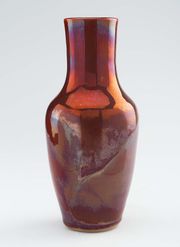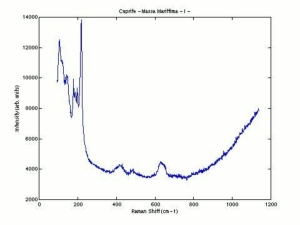Difference between revisions of "Copper oxide red"
| Line 1: | Line 1: | ||
| − | [[File:Oxbloodvase8740.jpg|thumb|Oxblood gaze vase MFA# 87.40]] | + | [[File:Oxbloodvase8740.jpg|thumb|Oxblood gaze vase<br>MFA# 87.40]] |
== Description == | == Description == | ||
| Line 9: | Line 9: | ||
[[[SliderGallery rightalign|Cupriteitaly1.jpg~Raman|copper oxide red.jpg~Chemical structure]]] | [[[SliderGallery rightalign|Cupriteitaly1.jpg~Raman|copper oxide red.jpg~Chemical structure]]] | ||
| + | == Risks == | ||
| − | == | + | Toxic by ingestion and inhalation. Skin contact causes irritation. |
| + | |||
| + | Chemet Corp.: [https://www.aardvarkclay.com/pdf/raw_materials/SDS-Copper%20Oxide%20Red%20(Cuprous%20Oxide).pdf SDS] | ||
| + | == Physical and Chemical Properties == | ||
Soluble in ammonium hydroxide. Reacts with hydrochloric, sulfuric and nitric acids to form copper salts. Insoluble in water. | Soluble in ammonium hydroxide. Reacts with hydrochloric, sulfuric and nitric acids to form copper salts. Insoluble in water. | ||
| Line 38: | Line 42: | ||
|} | |} | ||
| − | == | + | == Resources and Citations == |
| − | |||
| − | |||
| − | |||
| − | |||
| − | |||
| − | |||
| − | |||
| − | |||
| − | |||
| − | |||
| − | |||
* David Scott, 'Copper Compounds in Metals and Colorants: Oxides and Hydroxides', ''Studies in Conservation'', 42, 93-100, 1997 | * David Scott, 'Copper Compounds in Metals and Colorants: Oxides and Hydroxides', ''Studies in Conservation'', 42, 93-100, 1997 | ||
Revision as of 12:13, 27 October 2020
Description
Yellow, red or brown crystals depending on preparation method and particle size. Red copper oxide occurs in nature as the mineral cuprite (octahedral or cubic crystals). It is used as a red pigment in glass, artificial gems, enamels, and ceramics. The color can range from blood red to purple to brown in a reducing atmosphere and change to green in an oxidizing kiln. Red copper oxide is also used as a fungicide, Insecticide, antiseptic for fish nets and as an antifouling agent.
Synonyms and Related Terms
cuprous oxide; cuprite; copper protoxide; copper hemioxide; copper suboxide; CI 77402; Perenex; Yellow Cuprocide; Copper-Sandoz; Caocobre
Risks
Toxic by ingestion and inhalation. Skin contact causes irritation.
Chemet Corp.: SDS
Physical and Chemical Properties
Soluble in ammonium hydroxide. Reacts with hydrochloric, sulfuric and nitric acids to form copper salts. Insoluble in water.
| Composition | Cu2O |
|---|---|
| CAS | 1317-39-1 |
| Melting Point | 1232-1235 |
| Density | 5.75-6.09 |
| Molecular Weight | mol. wt. = 143.1 |
| Refractive Index | 2.705 |
| Boiling Point | 1800 |
Resources and Citations
- David Scott, 'Copper Compounds in Metals and Colorants: Oxides and Hydroxides', Studies in Conservation, 42, 93-100, 1997
- Richard S. Lewis, Hawley's Condensed Chemical Dictionary, Van Nostrand Reinhold, New York, 10th ed., 1993
- The Merck Index, Martha Windholz (ed.), Merck Research Labs, Rahway NJ, 10th edition, 1983 Comment: entry 2734
- Michael McCann, Artist Beware, Watson-Guptill Publications, New York City, 1979
- Robert Fournier, Illustrated Dictionary of Practical Pottery, Chilton Book Company, Radnor, PA, 1992
- CRC Handbook of Chemistry and Physics, Robert Weast (ed.), CRC Press, Boca Raton, Florida, v. 61, 1980 Comment: ref. index = 2.705

